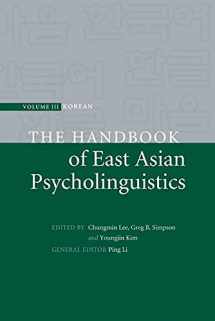
The Handbook of East Asian Psycholinguistics (The Handbook of East Asian Psycholinguistics 3 Volume Paperback Set) (Volume 3)
ISBN-13:
9781107503786
ISBN-10:
1107503787
Author:
Ping Li, Chungmin Lee, Greg B. Simpson, Youngjin Kim
Publication date:
2015
Publisher:
Cambridge University Press
Format:
Paperback
660 pages
Category:
Linguistics
,
Words, Language & Grammar
FREE US shipping
Book details
ISBN-13:
9781107503786
ISBN-10:
1107503787
Author:
Ping Li, Chungmin Lee, Greg B. Simpson, Youngjin Kim
Publication date:
2015
Publisher:
Cambridge University Press
Format:
Paperback
660 pages
Category:
Linguistics
,
Words, Language & Grammar
Summary
The Handbook of East Asian Psycholinguistics (The Handbook of East Asian Psycholinguistics 3 Volume Paperback Set) (Volume 3) (ISBN-13: 9781107503786 and ISBN-10: 1107503787), written by authors
Ping Li, Chungmin Lee, Greg B. Simpson, Youngjin Kim, was published by Cambridge University Press in 2015.
With an overall rating of 3.9 stars, it's a notable title among other
Linguistics
(Words, Language & Grammar ) books. You can easily purchase or rent The Handbook of East Asian Psycholinguistics (The Handbook of East Asian Psycholinguistics 3 Volume Paperback Set) (Volume 3) (Paperback) from BooksRun,
along with many other new and used
Linguistics
books
and textbooks.
And, if you're looking to sell your copy, our current buyback offer is $0.3.
Description
A large body of knowledge has accumulated in recent years on the cognitive processes and brain mechanisms underlying language. Much of this knowledge has come from studies of Indo-European languages, in particular English. Korean, a language of growing interest to linguists, differs significantly from most Indo-European languages in its grammar, its lexicon, and its written and spoken forms - features which have profound implications for the learning, representation and processing of language. This handbook, the third in a three-volume series on East Asian psycholinguistics, presents a state-of-the-art discussion of the psycholinguistic study of Korean. With contributions by over sixty leading scholars, it covers topics in first and second language acquisition, language processing and reading, language disorders in children and adults, and the relationships between language, brain, culture, and cognition. It will be invaluable to all scholars and students interested in the Korean language, as well as cognitive psychologists, linguists, and neuroscientists.


We would LOVE it if you could help us and other readers by reviewing the book
Book review

Congratulations! We have received your book review.
{user}
{createdAt}
by {truncated_author}


